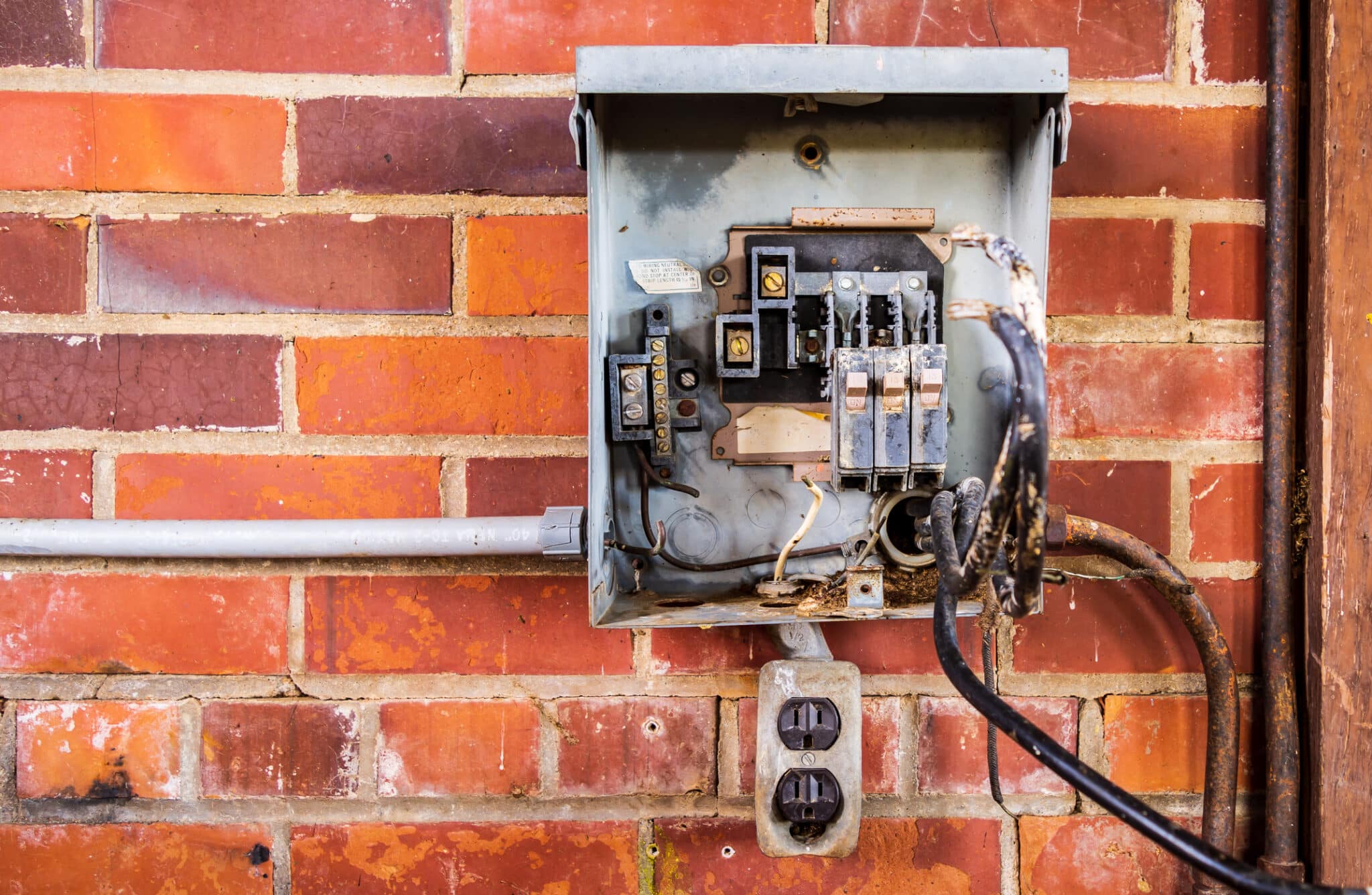Winter is tough on your home’s electrical system, and old electrical panels might be costing you more than you realize. When temperatures drop, old electrical panels face additional strain, struggling to keep up with modern demands and often becoming a costly liability.
From inefficiencies that inflate energy bills to safety risks that endanger your family, the hidden costs of old electrical panels often emerge during the colder months.
What Is an Electrical Panel and Why Does It Matter?
An electrical panel, also known as a breaker box, is the central hub of your home’s electrical system, distributing power to every part of your house. It ensures that electricity flows safely and efficiently to your outlets, lights, and appliances through individual circuits.
Each circuit is protected by a breaker, which automatically shuts off the power if the system detects an overload or fault, preventing overheating and potential fires.
Older electrical panels often lack the capacity to handle today’s increased electrical demands, leading to frequent breaker trips, flickering lights, or overheating wires.

The Hidden Costs of Old Electrical Panels
1. Higher Energy Bills
Old electrical panels struggle to keep up with the demands of modern electrical systems, leading to inefficiencies that waste energy.
When your panel isn’t operating efficiently, it consumes more electricity than necessary, causing utility bills to skyrocket, especially in winter when heaters and electric blankets are in constant use.
Over time, the extra costs from an inefficient panel add up, making an upgrade a much smarter financial choice. For homeowners in Lancaster, York, and Harrisburg, PA, where winter energy demands are higher, addressing this hidden cost can lead to significant savings.
2. Frequent Breaker Trips
An old electrical panel often fails to handle the increased electrical loads required by modern homes. Frequent breaker trips are a clear sign of an overworked panel and become more disruptive during winter when appliances like heaters, ovens, and holiday lights are used simultaneously.
These interruptions not only cause inconvenience but also accelerate the wear and tear on your panel and wiring, increasing the risk of long-term damage. Replacing an outdated panel eliminates these frustrations and ensures your home can handle the extra winter demand without issue.
3. Fire Hazards
Aging components in old electrical panels significantly increase the risk of electrical fires, especially during high-demand seasons like winter. Outdated panels, particularly those with fuses instead of circuit breakers, are prone to overheating and sparking, which can lead to catastrophic outcomes.
With the added strain from heating systems and festive lighting during the winter months, these fire hazards become even more concerning. Upgrading to a modern electrical panel protects your home from these dangers and ensures your family’s safety.
4. Limited Compatibility
Old electrical panels weren’t built to accommodate today’s energy-efficient appliances or smart home technology. This lack of compatibility forces homeowners to either limit the number of devices in use or spend money on costly workarounds.
As a result, you may face higher repair bills and lose out on the energy savings that modern systems provide. Replacing your panel ensures it’s capable of supporting modern appliances and technology, reducing costs while increasing convenience and functionality.
5. Expensive Emergency Repairs
When old electrical panels fail, it’s often during the worst times, such as winter storms or periods of peak energy use. These breakdowns frequently result in emergency repair calls, which can be both costly and stressful.
Beyond the expense, an outdated panel’s inability to handle heavy loads can leave your home powerless during critical moments when you need electricity the most. Upgrading your panel prevents these emergencies, giving you peace of mind and saving you money in the long term.
Winter-Specific Strain on Old Electrical Panels
Increased Heating Demands
Winter heating requirements place significant stress on old electrical panels, which often aren’t equipped to handle modern appliances. Devices like space heaters, HVAC systems, and electric blankets pull large amounts of power, overwhelming outdated systems.
This added strain makes it more likely for breaker trips, inefficiencies, and even overheating to occur. Homes with old electrical panels may find themselves facing frequent disruptions, costly repairs, or scrambling for temporary solutions to stay warm during freezing conditions. Replacing an old electrical panel ensures your home can safely handle the demands of winter heating.
Holiday Lighting and Decorations
The holidays bring joy, but they also highlight the limitations of old electrical panels. String lights, inflatable decorations, and other festive displays create an extra load on your electrical system.
Older panels often struggle to keep up, especially if multiple circuits are being used for holiday lighting and decorations. This can lead to tripped breakers, power surges, or even dangerous overheating of wires.
While holiday décor is meant to brighten the season, it frequently exposes the inefficiencies of old electrical panels, making an upgrade essential for safety and reliability.
Prolonged Use of Indoor Appliances
During winter, more time is spent indoors, which naturally increases the use of ovens, dishwashers, and entertainment systems. This constant activity puts tremendous pressure on old electrical panels, which may already be operating at their limits.
Over time, this prolonged stress can cause components in outdated panels to degrade further, resulting in performance issues and a less reliable electrical system. Upgrading from an old electrical panel ensures your home can meet the demands of daily life during the colder months.
Weather-Related Issues
Winter introduces external factors like moisture and freezing temperatures, which can exacerbate the vulnerabilities of old electrical panels. Moisture may cause corrosion in the panel’s components while freezing conditions can compromise wiring and connections.
These environmental factors put additional strain on aging systems, making them even more prone to failure. Ensuring your panel is modernized and free from the risks associated with old electrical panels is critical for keeping your home safe during winter’s harshest conditions.
Warning Signs of an Outdated Electrical Panel
Frequent Breaker Trips
Frequent breaker trips happen when your panel cannot handle the electrical load being placed on it. This issue is common with old panels that were not designed to meet modern energy demands, such as powering HVAC systems, space heaters, and large appliances simultaneously.
During winter, when electricity usage spikes, this problem becomes even more pronounced and can disrupt your daily routine.
Constantly resetting breakers not only causes frustration but also indicates that your electrical system is at risk of overloading, which can lead to bigger issues over time. If this is happening in your home, it’s a sign that your panel is struggling and needs attention.
Flickering Lights
Flickering or dimming lights can mean your panel is overloaded or failing to properly distribute electricity throughout your home. This problem often happens when multiple appliances are running at the same time, drawing more power than the panel can handle.
In winter, when heaters, ovens, and holiday lights are running simultaneously, this issue becomes more common and noticeable.
Flickering lights are not just annoying; they can also indicate underlying wiring issues or panel capacity problems that need to be addressed. Ensuring your panel is in good condition is key to maintaining reliable power during high-demand seasons.
Burning Smell or Discolored Outlets
A burning smell near your electrical panel or discolored outlets is a serious warning sign of overheating or faulty wiring. This occurs when an outdated panel struggles to manage the electricity flow, causing wires to overheat and potentially melt.
These issues are especially dangerous in winter, as increased demand from heating systems and appliances can push an already stressed panel to its limit.
Ignoring these signs can lead to electrical fires, putting your home and family at risk. If you notice a burning smell or heat coming from your panel, you should contact a professional electrician immediately.
Lack of Circuit Breakers
If your home still relies on fuses rather than modern circuit breakers, it’s a sign that your old electrical panels are outdated and inadequate for today’s electrical needs. Fuses are less safe and require manual replacement, which can be both inconvenient and risky.
Circuit breakers provide a safer and more efficient alternative, especially for homes with high energy demands during winter months.
The presence of fuses in your old electrical panels is a clear indication that it’s time to upgrade to a modern breaker box to meet today’s safety and performance standards.
Panel Age Over 25 Years
Most electrical panels have a lifespan of 20 to 30 years, meaning that any panel over 25 years old is nearing the end of its effectiveness. Even if the panel appears to work, aging components wear down over time and are more likely to fail under heavy use, especially in colder months.
Older panels also lack the capacity to handle the power demands of modern homes, leading to frequent trips and other issues.
During winter, when heating systems and appliances run constantly, these problems can become more severe and even dangerous. Replacing an old panel proactively is a smart way to avoid costly repairs and ensure your home remains safe and functional.
Benefits of Upgrading Your Electrical Panel
1. Improved Energy Efficiency
A new electrical panel is designed to handle the energy needs of modern appliances and systems with less waste. Unlike older panels that may struggle and consume excess energy, a modern panel ensures electricity is distributed efficiently throughout your home.
This translates into lower utility bills, especially in winter when heating systems and indoor appliances are in constant use. By upgrading, you can save money while reducing your home’s overall energy footprint.
2. Enhanced Safety
Safety is one of the most significant benefits of upgrading your electrical panel. Modern panels include advanced features, like better circuit breakers, that prevent overheating, electrical fires, and other hazards caused by overloaded circuits.
For older homes, especially those with fuses, the risk of fire increases during winter when electricity usage peaks. A new panel ensures your system is equipped to handle high loads safely, giving you peace of mind during the cold months.
3. Increased Electrical Capacity
Upgrading your electrical panel means you can handle the higher electrical demands of today’s homes without constant breaker trips or disruptions. New panels are designed with more circuits and greater amperage capacity to power everything from space heaters and electric ovens to charging stations for electric vehicles.
This added capacity makes life more convenient and helps prevent power outages during critical times, like a winter storm or holiday gatherings.
4. Compatibility With Modern Technology
Modern electrical panels are built to support the latest technology, including smart home systems and energy-efficient appliances. They provide a stable and reliable power supply, which is essential for ensuring your advanced devices work as intended.
Whether you’re upgrading your home with LED lighting or investing in a smart thermostat to save energy, a new panel ensures compatibility and optimal performance. Without this upgrade, your older panel may hold you back from enjoying the benefits of these modern innovations.
5. Higher Property Value
Upgrading your electrical panel is an improvement that adds value to your home. Potential buyers see a modern panel as a sign of safety, reliability, and reduced maintenance costs in the future.
For homes in areas like Lancaster, York, and Harrisburg, PA, where winter weather can take a toll on outdated systems, a new panel is a strong selling point.
It reassures buyers that the home is ready to meet current and future electrical needs, which can make it easier to sell and even increase its market value.
Steps to Upgrade Your Electrical Panel
1. Assess Your Home’s Electrical Needs
The first step in upgrading old electrical panels is determining whether your current system meets your household’s energy demands.
Modern homes, filled with energy-intensive appliances like HVAC systems, space heaters, and smart technology, need panels with greater capacity. An outdated panel may max out at 100 amps, while most modern panels handle 200 amps or more.
2. Hire a Professional Electrician
Replacing old electrical panels isn’t a DIY project—it requires expertise to ensure the job is done safely and in compliance with local codes. A professional electrician will inspect your system, recommend the right panel size, and handle the installation process.
This step is especially important for homeowners in Lancaster, York, and Harrisburg, PA, where extreme weather can put added strain on electrical systems. Hiring a professional ensures your new panel can handle the demands of harsh winters without any hiccups.
3. Choose the Right Panel Size
Modernizing your electrical system means choosing a panel that fits your home’s current and future needs. If you’re upgrading from an old electrical panel, you’ll likely need to move from a 100-amp to a 200-amp or even 400-amp system.
This ensures you’ll have enough capacity to power your appliances, handle winter’s extra demands, and accommodate any future additions like electric vehicle chargers or solar panels. Future-proofing your system now can save you money and hassle down the road.
4. Plan for Future Additions
When upgrading from an old electrical panel, it’s smart to think beyond your current needs. Consider the possibility of adding new appliances, converting to energy-efficient systems, or integrating smart home technology.
A larger panel with more circuits can handle these changes seamlessly, reducing the need for another upgrade later. Planning ahead ensures your home remains energy-efficient and prepared for whatever technological advancements come next.
Don’t Let Old Electrical Panels Leave You in the Cold This Winter!
Winter in Lancaster, York, or Harrisburg, PA, can put a heavy strain on your home’s old electrical panels, leading to higher energy bills, frequent breaker trips, and safety risks. Don’t wait for costly repairs or unsafe conditions—let Mister Sparky of Lancaster help you upgrade from old electrical panels to a modern, reliable system.
Our expert electricians ensure your home stays warm, powered, and worry-free this season. Call us today to replace your old electrical panels and take control of your electrical system!

Frequently Asked Questions (FAQ)
1. How do I know if my electrical panel needs to be replaced?
If your old electrical panel causes frequent breaker trips, flickering lights, or emits a burning smell, it’s likely time for a replacement. Panels older than 25 years or those using fuses instead of circuit breakers are outdated and may struggle with modern energy demands.
2. Is replacing an electrical panel expensive?
Replacing old electrical panels involves an upfront cost that depends on your home’s needs and the size of the panel. While it can feel costly, the investment pays off by improving energy efficiency, reducing utility bills, and avoiding expensive emergency repairs.
3. Can an old electrical panel cause electrical fires?
Yes, old electrical panels can cause fires due to aging components, corroded wiring, or their inability to handle modern power loads. Winter’s extra electrical usage adds strain, increasing the risk of overheating and sparks.
4. Do I need a permit to replace my electrical panel?
Most local codes require a permit to replace old electrical panels, ensuring the work complies with safety standards. Professional electricians typically manage the permit process, guaranteeing proper installation. For homeowners in Pennsylvania, meeting these requirements is essential to maintain a safe and compliant home.
5. How long does an electrical panel last?
Electrical panels typically last 20 to 30 years, but old electrical panels often fail to keep up with today’s power needs well before that. Aging systems are more prone to failure, especially during high-demand seasons like winter. If your panel is over 25 years old, it’s time to consider an upgrade for improved safety and efficiency.






